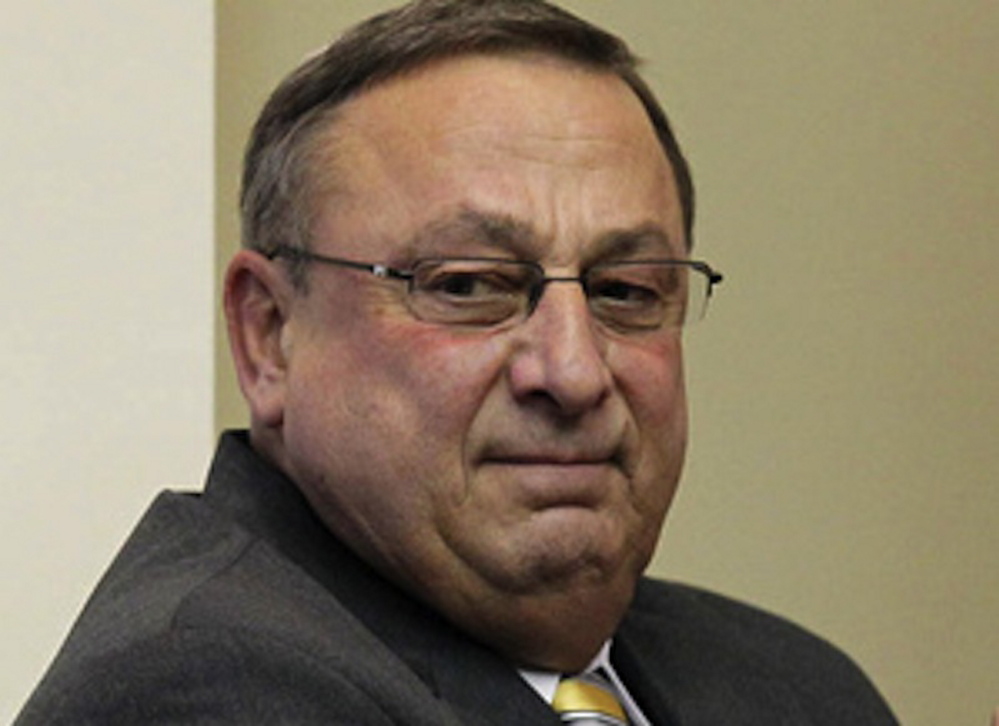AUGUSTA –– Gov. Paul LePage’s plan to fact-check campaign statements is raising constitutional free-speech concerns from civil libertarians and the state commission that would have to determine the truthfulness of political speech.
The governor’s proposed bill, sponsored by Sen. Doug Thomas, R-Ripley, would compel the Maine Commission on Governmental Ethics and Election Practices to investigate campaign claims if a candidate for statewide office filed a complaint. The bill, which Thomas says is intended to deter false claims, includes no penalties for making them.
“Every year the things we read in campaign materials and hear in radio ads or on TV become more ridiculous, and in some cases untrue,” Thomas said Wednesday at a hearing before the Legislature’s Veterans and Legal Affairs Committee. “Should there be no restraint, no limit, or no consequences for lying?”
Oamshri Amarasingham, public policy counsel for the American Civil Liberties Union of Maine, said the proposal is unconstitutional. She said it’s unfortunate that politicians and political action committees make false claims about their opponents, but it’s a much greater threat to democracy to make a government agency the arbiter of truth.
“Responsibility for seeking out the truth belongs with the people, with journalists, with scholars and with scientists,” Amarasingham said. “The ethics commission is plenty busy already. Do not add ‘truth police’ to their list of responsibilities.”
Amarasingham cited a 2012 U.S. Supreme Court decision involving Xavier Alvarez, a candidate for a water district in California. Alvarez made false claims, including that he won the Medal of Honor and played professional hockey.
He was later prosecuted under the federal Stolen Valor Act for his false claim about the Medal of Honor. The U.S. Supreme Court overturned the conviction and the Stolen Valor Act, ruling that Alvarez’s claims were constitutionally protected.
Hank Fenton, the governor’s deputy legal counsel, said the bill, L.D. 1834, would bring civility to political campaigns. He said it avoids any constitutional violation because there would be no penalty if the ethics commission declared a campaign statement false.
Thomas said the declaration of a false claim would deter candidates from using false claims.
Ben Grant, chairman of the Maine Democratic Party, said in a written statement that if LePage “played by his own rules,” the bill would have more credibility.
“He’s lacked civil discourse since day one of taking office, making false claims and hurtful comments that hit below the belt and have hurt the reputation of our state,” Grant said. “If LePage was truly concerned with honesty in politics, he’d follow his own campaign promise of transparency and accountability. … No last-ditch campaign stunt is going to undo three years of bullying.”
Rep. Thomas R.W. Longstaff, D-Waterville, a member of the Veterans and Legal Affairs Committee, said he was concerned that shaming or punishing people for speech would violate the First Amendment.
According to the bill, such false statements could relate to issues including a candidate’s educational background, criminal history, military service or voting record.
The bill includes a provision to require the ethics commission to make a declaration if a campaign or political action committee published or distributed a false statement knowingly or with “reckless disregard of whether it was false or not.”
Jonathan Wayne, director of the ethics commission, said it is difficult to determine how the proposal would affect his six-person staff. Wayne and another staff person now investigate potential violations of election law.
“There could be an impact on how we perform our jobs,” said Wayne, noting that the bill would not give the commission the discretion to toss out frivolous complaints.
He also said it’s likely “there will be politically motivated complaints.”
The LePage administration has acknowledged that campaigns sometimes use complaints to the ethics commission as a political strategy.
Last year, the governor vetoed a proposal to impose stiffer penalties for late report filings by candidates and campaign committees. In his veto message, LePage wrote that the ethics commission had become a place for “political warfare” by political operatives to “win a headline leading up to Election Day.”
Wayne told the committee that he understands the intention of the bill, but he noted that the Maine Supreme Judicial Court overturned a decision by the commission seven years ago to fine a legislative candidate for using an endorsement without the person’s permission.
Wayne said the court found that the decision violated the First Amendment.
With the court cases as a backdrop, it appears that the governor’s proposal faces long odds for passage. The Veterans and Legal Affairs Committee is expected to get an opinion about its constitutionality from the state Attorney General’s Office.
Steve Mistler can be contacted at 791-6345 or at:
smistler@pressherald.com
Twitter: @stevemistler
Send questions/comments to the editors.



Success. Please wait for the page to reload. If the page does not reload within 5 seconds, please refresh the page.
Enter your email and password to access comments.
Hi, to comment on stories you must . This profile is in addition to your subscription and website login.
Already have a commenting profile? .
Invalid username/password.
Please check your email to confirm and complete your registration.
Only subscribers are eligible to post comments. Please subscribe or login first for digital access. Here’s why.
Use the form below to reset your password. When you've submitted your account email, we will send an email with a reset code.